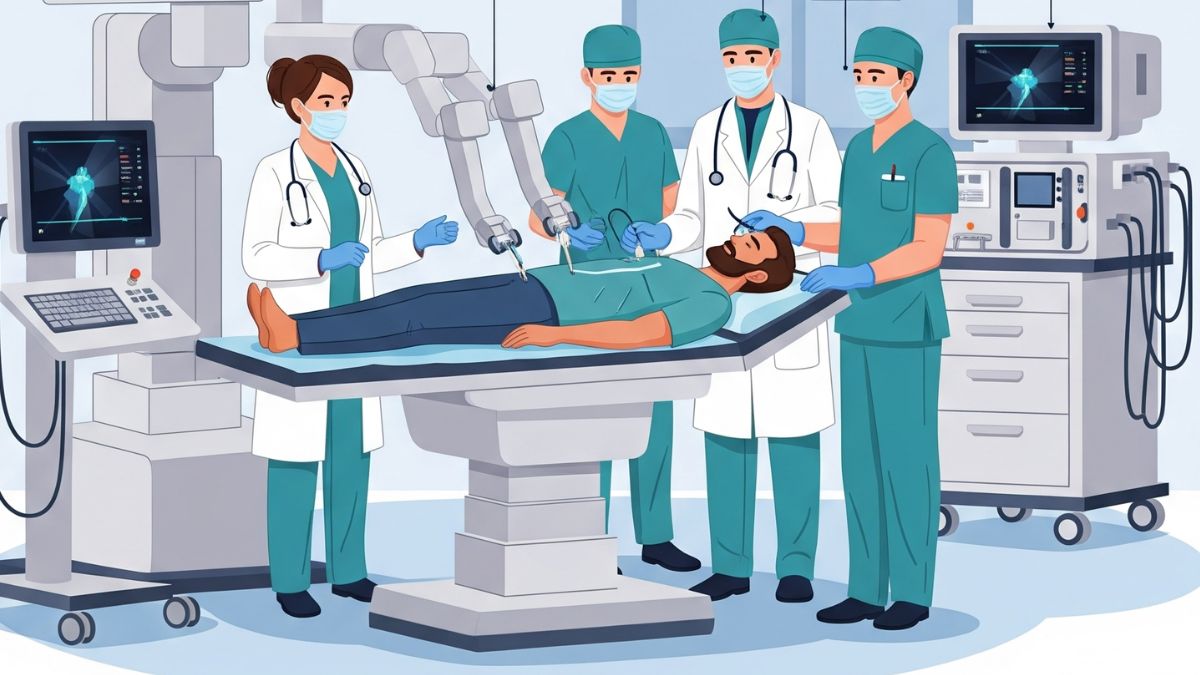Prostate cancer , one of the most common cancers affecting men, has been steadily increasing in India particularly in urban areas. Though often symptomless in its early stages, the disease can lead to serious complications if not detected and treated in time. With awareness still limited among many men, understanding the symptoms, risk factors and treatment options is crucial.
Firstpost spoke to Dr Trinanjan Basu, HOD & Senior Consultant—Radiation Oncology at HCG Cancer Centre (Borivali) to learn more about prostate cancer’s prevalence, diagnosis and how timely intervention can improve survival rates.
What is prostate cancer and how prevalent is it in men in India?
Dr Basu: Prostate cancer affects the prostate gland, a part of the male reproductive system. It is a male-specific cancer, typically occurring in older men. In India, it ranks as the fourth most common cancer among men, especially in metropolitan cities. According to cancer registries, the incidence is about 10 cases per 1 lakh male population in urban areas, with a consistent upward trend over the past decade.
Watch also: Former US President Joe Biden Diagnosed with Aggressive Prostate Cancer | Firstpost America | N18G
What are the initial signs and symptoms of prostate cancer ?
Dr Basu: Early-stage prostate cancer is usually asymptomatic, making regular screening essential. When symptoms do appear, they often involve changes in urinary habits, such as increased frequency or urgency, difficulty in urination, blood in urine, nighttime urination, and reduced bladder capacity. These symptoms should never be ignored, especially in elderly men.
How is prostate cancer diagnosed? What tests are typically performed?
Dr Basu: Diagnosis typically begins with a Digital Rectal Examination (DRE) to check for abnormalities in the prostate. If suspicion arises, further tests include MRI of the prostate and a prostate biopsy to confirm cancer presence. The Prostate-Specific Antigen (PSA) blood test is commonly used for initial screening and monitoring. These tests help determine the stage and aggressiveness of the cancer.
What are the key risk factors for developing prostate cancer?
Dr Basu: Age is a major risk factor, with most diagnoses occurring between ages 70 and 75. Genetics also play a role—men with a family history of prostate cancer or known BRCA gene mutations are at higher risk and should consider early screening starting between ages 40 and 45. While lifestyle and ethnicity influence risk, they were not specifically addressed here.
What happens if prostate cancer is left untreated?
Dr Basu: Without diagnosis or treatment, prostate cancer can progress from a localized condition to advanced or metastatic stages, severely worsening the prognosis. Once it reaches the hormone-refractory or castration-resistant phase, treatment options decline and the average survival drops to 15–20 months. Advanced stages are associated with serious complications and reduced quality of life.
What treatment options are available at different stages of prostate cancer?
Dr Basu: Treatment varies by stage and risk category. Active surveillance may be appropriate for very early-stage (Stage 1) cancer, especially in older men. For Stage 2 and beyond, options include surgery, radiotherapy, hormone therapy, or combinations thereof. Chemotherapy may be used in advanced cases. Early diagnosis and timely treatment are critical for better outcomes.
Can prostate cancer be cured? What are the survival rates?
Dr Basu: Prostate cancer is highly curable, particularly when detected early. Stage 1 patients are often monitored without immediate treatment. Stage 2 has about an 85% cure rate, Stage 3 around 70%, and Stage 4 less than 40%. Hormone sensitivity also affects outcomes; once cancer becomes castration-resistant, treatment efficacy declines significantly.
How does age affect treatment decisions and outcomes?
Dr Basu: Age is a key factor in treatment planning and prognosis. With a median diagnosis age of 70–75, screening beyond 70 can still be beneficial. Younger patients with early-stage disease generally respond better to treatment and have longer survival, while older patients may receive more conservative treatment depending on overall health and comorbidities.
What role do lifestyle factors play in preventing or reducing recurrence of prostate cancer?
Dr Basu: Maintaining a healthy lifestyle is important for overall health, although prostate cancer is not directly linked to diet as some other cancers are. Diets high in red meat, fats, or those causing hormonal imbalance, such as low zinc intake or high saturated fats may increase risk and should be avoided. Exercise, combining aerobic and anaerobic activities, improves quality of life and helps counter the side effects of hormone therapy like cholesterol imbalance and bone density loss. Higher body mass index, especially abdominal obesity, is associated with increased risk due to hormonal effects. Overall, a balanced diet, regular physical activity, and healthy weight management are key preventive strategies.
How important is early detection and how can men be encouraged to get screened?
Dr Basu: Early detection is crucial for high cure rates and avoiding aggressive treatments. The PSA blood test should be recommended for all men over 50, and earlier (around 40–45 years) for those with a family history or genetic risks. Raising public awareness, encouraging regular health check-ups, and educating men about symptoms and screening methods can significantly improve early diagnosis and save lives.


)

)
)
)
)
)
)
)
)



